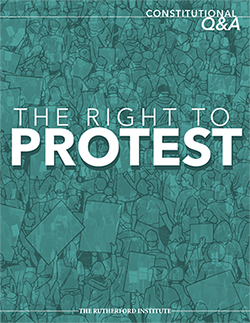On The Front Lines
Rutherford Institute Rebuts Effort to Curtail First Amendment Activities, Issues Guidance on Constitutional Rights of Citizens to Peacefully Protest
Charlottesville, Va. — Pushing back against an effort to limit the First Amendment rights of those individuals who express ideas that are unpopular, controversial or at odds with what the government determines to be acceptable, The Rutherford Institute has issued constitutional guidelines on the rights of citizens to engage in peaceful protest activities. Warning that the government is contributing to a growing underclass of Americans who are being told that they can't take part in American public life unless they “fit in,” The Rutherford Institute denounces efforts by federal, state and local governments to adopt laws and tactics aimed at stifling dissent, such as forcing protesters into “free speech zones,” declaring public areas off-limits for expression, and using militarized police to intimidate and deter citizens from exercising their right to demonstrate.
The Rutherford Institute’s “Constitutional Q&A: The Right to Protest” provides legal guidance on where persons are allowed to protest, what can be done and said during protests, and what steps should be taken in order to organize peaceful large events and demonstrations.
“The unspoken freedom enshrined in the First Amendment is the right to think freely and openly debate issues without being muzzled or treated like a criminal. Unfortunately, whether it’s through the use of so-called “free speech zones,” the requirement of speech permits, the policing of online forums, or a litany of laws and policies that criminalize expressive activities, what we’re seeing is the caging of free speech and the asphyxiation of the First Amendment,” said constitutional attorney John W. Whitehead, president of The Rutherford Institute and author of Battlefield America: The War on the American People. “What this country needs is more speech not less. What we don’t need is to allow our fears—fear for our safety, fear of each other, fear of being labeled racist or hateful or prejudiced, etc.—to trump our freedom of speech and muzzle us far more effectively than any government edict could. Ultimately the war on free speech—and that’s exactly what it is: a war being waged by Americans against other Americans—is a war that is driven by fear.”
In issuing the “Constitutional Q&A: The Right to Protest” guidelines, The Rutherford Institute warns that protest laws, free speech zones, bubble zones, trespass zones and hate crime laws are conspiring to discourage lawful First Amendment activities, specifically the right to engage in expressive activities such as peaceful protest. For instance, a proposed law in Minnesota would have forced protesters to pay for the cost of having police on hand to “police” demonstrations. A proposed North Dakota law would give drivers the green light to “accidentally” run over protesters who are blocking a public roadway. In Iowa, protesters who block highways with speeds posted above 55 mph could spend five years in prison, plus a fine of up to $7,500. A North Carolina law would make it a crime to heckle state officials. Under this law, shouting at a former governor would constitute a crime. Virginia wants to subject protesters who engage in an “unlawful assembly” after “having been lawfully warned to disperse” with up to a year of jail time and a fine of up to $2,500. Yet as John W. Whitehead points out, “These laws are not about protecting private property or public roads. Rather, they are intended to muzzle discontent and discourage anyone from challenging government authority.”




